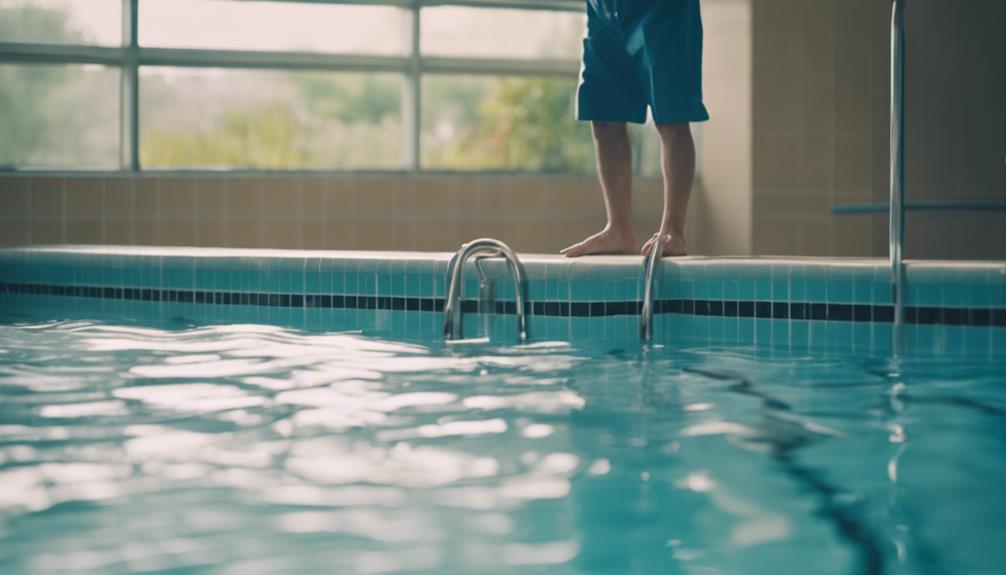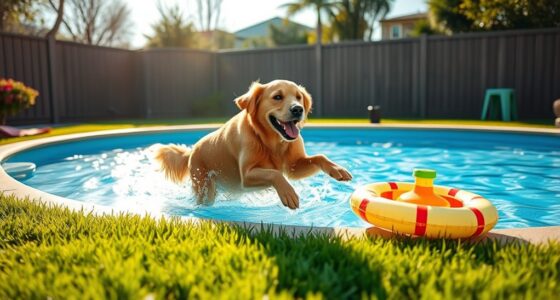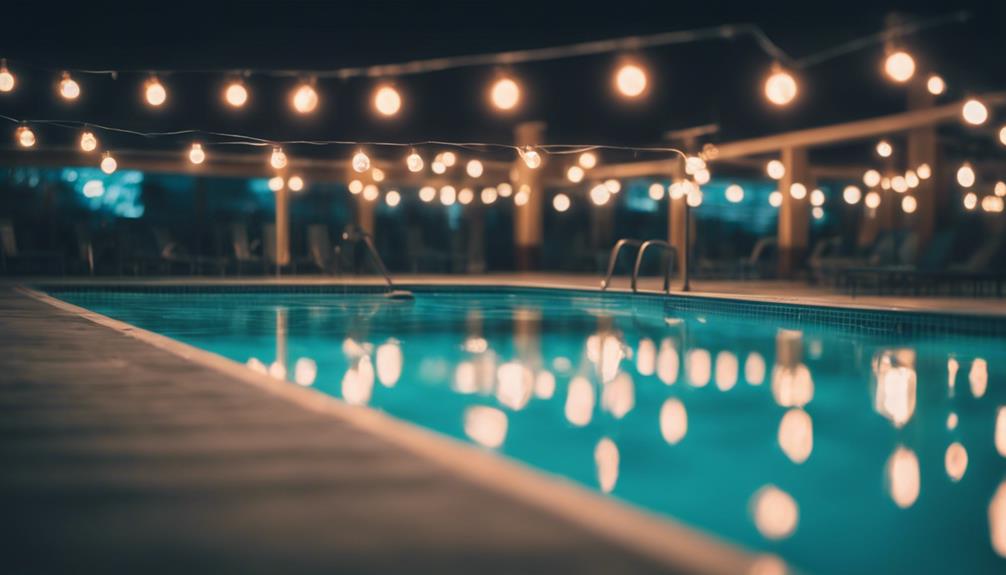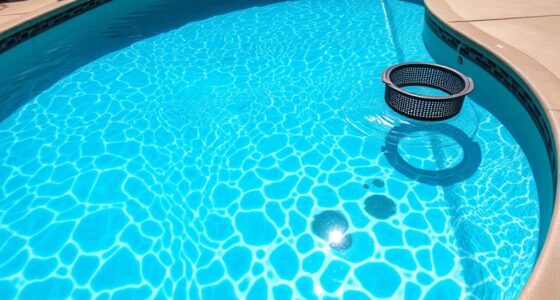To handle pool chemicals safely, always store them in their original, labeled containers in a cool, dry, well-ventilated area away from sunlight, heat, and incompatible substances like acids and chlorines. Wear protective gear such as gloves, goggles, and masks when handling or opening containers. Carefully follow safe procedures, inspect containers regularly, and keep chemicals organized and segregated. Prioritizing safety measures prevents hazards—stick with it, and you’ll learn more essential tips for safe pool chemical management.
Key Takeaways
- Store chemicals in their original, labeled containers in a cool, dry, ventilated area away from heat and sunlight.
- Always wear appropriate protective gear, including gloves, goggles, and masks, when handling pool chemicals.
- Keep incompatible chemicals, like acids and chlorines, segregated to prevent dangerous reactions.
- Regularly inspect storage containers for leaks, corrosion, or damage before use.
- Follow proper handling procedures, avoiding mixing chemicals and ensuring proper ventilation during use.

Have you ever wondered how to handle chemicals safely in your workplace or at home? Managing pool chemicals requires more than just pouring them in the water; it demands a clear understanding of proper storage protocols and the use of protective gear. When it comes to chemicals, safety isn’t accidental — it’s intentional. You need to keep chemicals stored correctly to prevent accidental spills, leaks, or reactions that could cause injuries or property damage. Store pool chemicals in a cool, dry, well-ventilated area, away from direct sunlight, heat sources, or open flames. Avoid stacking containers too high to prevent tipping, and always keep them in their original containers with labels intact. Segregate incompatible chemicals, like acids and chlorines, to minimize the risk of dangerous reactions. If you’re working with multiple chemicals, plan your storage layout carefully and regularly inspect containers for leaks, corrosion, or damage. Proper storage protocols are your first line of defense against accidents. Additionally, using cost-effective storage solutions can help you maintain safety without overspending.
Equally important is wearing the right protective gear whenever you handle pool chemicals. Gloves made of rubber or neoprene protect your skin from corrosive substances, preventing burns or irritation. Goggles or safety glasses shield your eyes from splashes or fumes that can cause serious damage. A mask or respirator might be necessary if you’re mixing chemicals or working in a poorly ventilated area, as inhaling fumes can lead to respiratory issues. When handling chemicals, always wear long sleeves and pants to minimize skin exposure. Remember, protective gear isn’t just a formality; it’s a critical safety measure that can save you from severe injuries. Before opening any container, put on your gloves and goggles to create a barrier against accidental splashes. When finished, wash your hands thoroughly, even if you wore gloves, to remove any residual chemicals. Proper use of protective gear demonstrates your commitment to safety and markedly reduces your risk of incidents.
Handling pool chemicals safely involves diligent adherence to storage protocols and consistently wearing protective gear. By keeping chemicals stored in designated areas and inspecting containers regularly, you prevent many common hazards. Equally, never underestimate the power of personal protective equipment — it’s your best defense against chemical splashes, fumes, and skin contact. With careful planning and the right precautions, you can maintain a safe environment while enjoying your pool without worry. Remember, safety isn’t complicated; it’s about making smart choices every time you handle chemicals.
Frequently Asked Questions
How Should I Store Pool Chemicals Safely at Home?
You should store pool chemicals in a secure, dry, and well-ventilated area away from household items, especially food or drinks. Use clearly labeled, sturdy containers to prevent spills and accidents. Keep chemicals out of reach of children and pets, and avoid storing them near heat sources or direct sunlight. Proper chemical storage guarantees household safety and reduces the risk of hazardous reactions, keeping your home safe.
What Are the First Steps in Case of Chemical Exposure?
Imagine this: panic, pain, and potential poisoning. When chemical exposure occurs, act swiftly. First, follow emergency procedures—immediately evacuate the area and remove contaminated clothing. Then, use protective equipment like gloves and goggles to prevent further harm. Rinse affected skin or eyes with plenty of water for at least 15 minutes. Seek medical attention right away, and report the incident to ensure proper cleanup and safety measures.
Are There Eco-Friendly Alternatives to Traditional Pool Chemicals?
You’re curious about eco-friendly alternatives to traditional pool chemicals. You can explore natural sanitizers like mineral-based options, saltwater systems, or UV and ozone purifiers. These eco-friendly alternatives reduce chemical use, lessen environmental impact, and are safer for swimmers. By switching to natural sanitizers, you maintain clean, healthy pools while supporting sustainability efforts and minimizing chemical hazards, making your pool environment safer and greener.
How Often Should I Test My Pool Water for Chemical Levels?
Oh, the thrill of endless pool testing—because who doesn’t love balancing pH and Chlorine levels? You should test your water at least 2-3 times a week during peak swimming season, and weekly when it’s calmer. Consistent checks help prevent murky mishaps and skin irritations. Keep an eye on pH balance and Chlorine levels, and your pool will stay crystal clear, inviting, and totally Instagram-worthy.
Can Pool Chemicals Be Safely Mixed Together?
You should never mix pool chemicals without understanding their chemical compatibility, as improper mixing can cause dangerous chemical reactions. Always read labels and follow manufacturer instructions to guarantee safety. Adding chemicals in the wrong order or combining incompatible substances can release toxic gases or cause fires. To keep your pool safe, only mix chemicals when specifically instructed, and never experiment with different chemicals together.
Conclusion
By mastering chemical safety, you’re the guardian of your pool’s sparkle and your loved ones’ well-being. Think of handling chemicals as tending a delicate garden—you must respect each element’s power and nurture it carefully. When you stay vigilant and follow proper procedures, you’re not just avoiding hazards—you’re creating a sanctuary of crystal-clear water and peace of mind. Embrace safety like a trusted friend, and watch your pool become a haven of joy and serenity.










